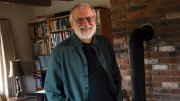At 6 a.m. in western Baghdad, the thermometer has already punched through 100 degrees across the barren lands around Camp Victory. As Colonel Mark Martins, J.D. ’90, takes off for his thrice-weekly 5.7-mile run, he pushes to keep up with his boss and longtime friend David Petraeus, commanding general of the 168,000 coalition troops stationed in Iraq. They cruise quickly past an armored Humvee, soon pounding out a better than six-minute-mile pace along the scorched pavement that’s been laid down across the desert floor. Later, they adjourn to the faux-marble anteroom of one of Saddam Hussein’s former hunting cottages where each churns out 100 push-ups, with ramrod-straight backs, in under 90 seconds.
The two men have known each other since 1992, when Petraeus was a battalion commander and Martins a newly minted military trial lawyer, both in the 101st Airborne Division. They still share a penchant, as scholar-athletes, for pushing “the pedal to the floor in everything we do,” says Martins, who was valedictorian of West Point’s class of 1983, earned first-class honors as a Rhodes Scholar at Oxford in 1985, and graduated magna cum laude from Harvard Law School.
These days, Martins is Petraeus’s legal adviser. As the staff judge advocate for the multinational force in Iraq since May 2006, he also supervises 670 lawyers and paralegal staffers—essentially a substantial law firm—in a war zone. He works seven days a week, traveling throughout Iraq in Blackhawk helicopters, C-130 transport planes, or armored vehicles, and is lucky to get six hours of sleep at night. Like all soldiers in Baghdad, he is under constant threat from indirect fire and wears a Kevlar helmet and heavy armored vest when leaving the relative safety of military bases; four legal staffers whom he knew have been killed. His closest brush with death to date came last year, when a 122-millimeter Katyusha rocket flew through the air and exploded on a wall next to him. Martins, who was lucky enough to be in the shadow of the blast, was fine, save for some ringing in his ears.
His legal activities range widely: international and administrative law, command advice on rules of engagement and use of federal appropriations, foreign claims (by individuals against the U.S. military), criminal work, legal assistance for troops, and support for Iraqi investigative and judicial systems.
One day’s work, for example, saw Martins inspecting an Iraqi detention center with his Iraqi counterparts, traveling to meet a local judge and prosecutor to hear about their training and support needs, and attending a bar association meeting to discuss the establishment of offices, administrative support, and security for local defense counsel representing crime suspects. Later, he worked to assemble experts to secure and catalog recovered Iraqi property records, and followed up with a brainstorming session with western and Iraqi businessmen on how the country’s public contracting procedures could be made less vulnerable to corruption. Late in the day, he helped guide junior judge advocates in the U.S. military who had checked in with him on coalition legal cases. By the time paperwork, phone calls, and e-mails were completed it was around 10:30 p.m.
The mission is daunting: to encourage the rule of law in a war-torn country. Now that the “surge” has lowered levels of violence, the top priority for Martins is, in fact, education. He wants to help the chief judge of Iraq and his key ministers establish an advanced training course for criminal investigators. “Weaning Iraqi investigators and courts from their reliance on confessions is a worthy goal,” he says. His constant refrain to his Iraqi counterparts is “Focus on fingerprints, ballistics, and other forensic data”—the best way, he asserts, to avoid human bias and to lower incentives to mistreat suspects.
Most of the roughly 5,000 trials conducted by the Central Criminal Court of Iraq in Baghdad in 2007 still didn’t involve modern evidence-collection techniques, but the proportion of those relying on some form of forensic data is on the rise. “Iraqi judges by and large understand these concepts,” he reports, “but the system has to be built up to get more proper evidence from the streets, where crime is occurring, and into the courtroom.”
Iraq’s secular legal system—as opposed to shari’a and tribal courts, which function locally without government sanction—is based principally on the continental European model. Under Iraqi law, for example, a magistrate with broad powers conducts a criminal investigation before referring the case to a panel of three trial judges. According to Martins, who interacts with hundreds of magistrates and judges across the country, Iraq’s legal professionals, at long last, have potential to cross sectarian lines and focus on the law.
Still, the possibility of corruption and intimidation is always present. “Iraq’s pre-existing secular courts weren’t so much corrupted by Saddam as they were displaced by special and revolutionary courts,” he notes. “Today, if the Iraqi judges and their families feel secure, many judges will enforce the law regardless of sect, tribe, or other improper influence.” Martins notes, however, that “these judges are human, too, and if they feel exposed, their decisions may well reflect the intimidation.”
In most major criminal prosecutions, explains Martins, proceedings are conducted in a secure complex in Baghdad where judges and their families live all the time, along with witnesses who require protection there. One case he has found particularly encouraging is the pending landmark prosecution of two Shiite government officials arrested in 2007—Hakim al-Zamili, the former deputy ministry of health, and Hamid al-Shammari, the former head of that ministry’s security service—both accused in the killing and kidnapping of hundreds of Sunnis. It is expected to be the first case to subject high-ranking Shiites to judicial trial for alleged sectarian crimes.
Not surprisingly, Martins is reluctant to broadcast his views of Iraq’s future. “You won’t get a simplistic prediction from me,” he warns. “The rule of law does not yet prevail here, and economic activity still must really accelerate to have an impact on common Iraqis. This will need to be a long effort in order to be successful. In the areas I’m most familiar with, I have seen the Iraqis achieve modest successes, taking small steps. But such incremental progress is important, and I tend to think it will be the methodical, unsensational steps that ultimately will bring lasting security.” As examples, he points to a recent Iraqi court case in which one attorney introduced expert testimony (about the remote detonation of an improvised explosive device) that quickly helped to identify a guilty defendant and exonerate two others. In another case, an Iraqi lawyer successfully persuaded the Iraqi Bar Association to advocate for much-needed changes in the country’s rules of criminal procedure.
Martins devoted his National War College thesis to another recent hot-button topic: Should terrorists be tried in military tribunals or in U.S. federal court? He’s not allowed to comment on matters that he’s directly involved in, but he notes that terror offenses, because they necessarily involve violence committed to advance a political objective, pose great challenges for any court, military or civilian.
When a “war on terror” has been declared, he notes, there is a great risk of being caught in a nasty cycle of “victor’s justice”—which is no justice at all. The only way out of this cycle is “to try defendants according to the facts and the law, to acquit where guilt cannot be proven beyond a reasonable doubt, and to make a full record so that all can judge both the judgment and the process, and even re-evaluate both as new information comes to light over time.” Legitimacy, he adds, “cannot be taken for granted by any court. In this light, we do not yet have an adequate terror court. Making a terror case in U.S. federal court promotes fairness and legitimacy on one level, but risks exposure of counterterror secrets and harm to trial participants while posing other serious risks to the legal system—such as expansion of conspiracy doctrines—and to society.”
Is there a better solution? Martins believes “military commissions can eventually pass constitutional muster [as legitimate courts] and have potential to develop into prudent and effective counterterror institutions.” He’s well aware that such commissions remain subject to reasonable concerns about independence and fairness. “The only thing I am sure of,” he adds, “is that a terror court consistent with our values will be one in which, to paraphrase Justice Jackson at Nuremberg, ‘Power pays tribute to Reason.’”
Martins defers when asked what role, if any, he had in shaping Petraeus’s counter-insurgency strategy. The general’s thinking, he says, “is highly individual, sophisticated, and pragmatic. Sometimes he says things that seem to echo points I’ve emphasized, but I can’t really know if I’ve accelerated his arrival at something I regard as an insight, or if he reached the insight on his own.”
Petraeus, he says, is “very, very tough and disciplined but also aware of the power of ideas and emotion in human endeavors, particularly war. He’s also completely secure intellectually, an attribute that I believe makes him open to advice and information from every source.”
The same could be said of Martins himself. At West Point, he excelled both in the classroom and at sports. After graduating and completing U.S. Army Ranger training, the Rhodes took him to England to study politics, philosophy, and economics. “Oxford compelled me to stand in the shoes of those who disagreed with my most basic assumptions and to seek to understand and even master their arguments before surmounting them,” he recalls. “That process, if undertaken honestly, changes you, so that when you get around to the surmounting part, you’ve grown. This is valuable, and not only for soldiers.” Once back in the United States, he served for two years as an infantry platoon leader with the 82d Airborne Division at Fort Bragg before attending law school.
Drawn to the law by his study at Oxford of H.L.A. Hart, an influential, twentieth-century British legal scholar, and his own observations on the role of dissent in military organizations, Martins says his favorite Harvard professors were the late Frankfurter professor of law Abram Chayes, Story professor of law Daniel Meltzer, and Walmsley University Professor Frank Michelman. “Those,” he says, “were three tremendous years of sampling widely from course and lecture offerings across the law school and University, of late-night discussions at Gannett House and elsewhere on the major issues of the day,” and “of weekend dashes with Kate [his wife, an army helicopter pilot, whom he met at West Point] to our favorite spots in Maine, Vermont, and New Hampshire.” He also ran four marathons, including Boston’s.
Martins has since dedicated his professional life to the military—despite the modest pay, inherent dangers, and long absences from family. He is painfully aware that when his son and daughter graduate from high school, he will have been absent for four years of their childhoods. But the soldier’s life has its advantages, he says, and he has no plans to leave it anytime soon: “The life is very familiar.” He grew up in a close-knit family in the Bronx, with a father who was also a career officer, a physician who rose to become chief of the army’s neurosurgery service.
Back in Iraq, following his workout with Petraeus, Martins heads for breakfast in his sweaty running gear. Leaning up against the wall in the hunting-lodge kitchen, he talks about his days at West Point and Harvard. West Point, he says, “wasn’t a place that cultivated appearances of effortless superiority. At Harvard, sweating and repeated tries were certainly nothing to be ashamed of, but neither were they [activities] sought for themselves. A smarter approach was just smarter, regardless of how it was conceived.
“Iraq is the toughest challenge I have encountered from both perspectives,” he adds. “We’ll continue to need persistence here, but we’ll also continue to need smart approaches that take account of new developments. And even then, there will be no guarantees of victory in the conventional military sense.”
Willy Stern, M.P.A. ’91, was embedded last year as a journalist in Iraq with the Army’s First Cavalry Division out of Fort Hood, Texas.








